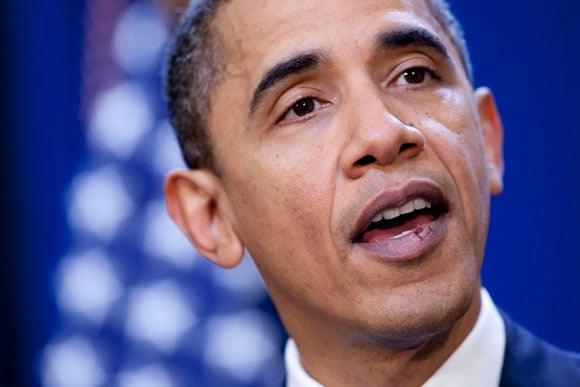Stocks rose, copper and gold climbed to all-time highs and Treasuries fell after President Barack Obama agreed to extend tax cuts, offsetting concern that Europe's debt crisis will spread further.
Stocks rallied, copper and gold climbed to all-time highs and Treasuries fell after President Barack Obama agreed to extend tax cuts, overshadowing concern that Europe's debt crisis will spread further.
The Standard & Poor's 500 Index increased 0.9 percent to 1,234.43, its highest level since September 2008, and the Nasdaq Composite Index reached an almost three-year high on a closing basis. The yield on the 10-year Treasury advanced 12 basis points to 3.05 percent. The Dollar Index fell 0.3 percent. Copper rallied as much as 3.1 percent, gold jumped to $1,432.50 an ounce and oil rose to a 26-month high of almost $91 a barrel.
The S&P 500 returned to its highest level since the aftermath of Lehman Brothers Holdings Inc.'s bankruptcy after Obama said he'll agree to a two-year extension on all Bush-era tax cuts in a compromise he called “an essential step on the road to recovery.” The European Union is set to approve Ireland's rescue package, while the region's finance ministers ruled out immediate aid for Portugal and Spain or an increase in the 750 billion-euro ($1 trillion) debt crisis fund.
The U.S. tax cut extension “places less of an onus on monetary policy to actually stimulate the economy,” David Forrester, a currency economist at Barclays Capital, said in a Bloomberg Television interview from Singapore. In Europe, there's “lots of disagreement among policy makers, which is creating more uncertainty,” he said.
Citigroup Stake
Gains in S&P 500 industry groups were led by financial companies and commodity producers, which climbed at least 1.2 percent. Citigroup Inc. rallied 2.7 percent as the U.S. sold its remaining stock in the bank for $10.5 billion, bringing the country's third-biggest bank a step closer to independence from the government following a $45 billion bailout in 2008.
More than five companies rose for every one that fell on the Stoxx 600, as all 19 industry groups advanced, while the MSCI Asia Pacific Index gained 0.4 percent. BHP Billiton Ltd. led mining stocks higher, rising 3.5 percent. Unilever climbed 4.2 percent after Morgan Stanley recommended shares of the world's second-largest consumer-goods maker.
BP Plc climbed 2.2 percent as the company was said to consider selling some North Sea assets. Tesco Plc advanced 2.3 percent after the U.K.'s largest supermarket chain posted increased sales. Porsche SE jumped 4.8 percent as Barclays Plc lifted its recommendation on the carmaker to “overweight.”
Emerging Markets Rally
The MSCI Emerging Markets Index climbed for a fifth day, rising 0.6 percent to the highest level in three weeks. Russia's Micex Index advanced 1.1 percent to a 2 1/2 year high as OAO Polyus Gold shares surged 6.3 percent. The country's largest producer of the metal may merge with a global competitor as early as next year to form a “Top 3” gold miner, billionaire owner Mikhail Prokhorov said in an interview with Bloomberg Television yesterday in Moscow.
The three-year Treasury note yield rose five basis points to 0.74 percent before the government sells $32 billion of the securities, the first of three auctions this week totaling $66 billion. Obama said he would accept lower rates on high earners' income, dividends, capital gains and multimillion-dollar estates for the next two years to break a stalemate over extending the Bush administration's tax cuts for middle-class taxpayers before Congress adjourns. The current tax rates, enacted in 2001 and 2003, are set to increase Dec. 31.
The German 10-year bund yield rose six basis points to 2.91 percent. The extra yield, or spread, investors demand to hold Irish 10-year bonds instead of bunds fell 18 basis points to 517, or 5.17 percentage points, according to data compiled by Bloomberg.
Irish Parliament
Irish Finance Minister Brian Lenihan will lay out the 2011 budget in parliament in Dublin at 3:45 p.m., adding to measures of about 14 billion euros over the last two years. The EU has given Ireland until 2015 to reduce its budget deficit to 3 percent of gross domestic product from about 12 percent of GDP this year.
The spread between Portuguese 10-year bonds and equivalent- maturity German debt fell three basis points to 308 basis points, with Spanish spreads two basis points higher at 232, and Italian spreads down three basis points at 162.
Credit-default swaps insuring junk-rated European corporate bonds fell to the lowest in three weeks, signaling an improvement in investor perceptions of credit quality, with the Markit iTraxx Crossover Index declining 8 basis points to 458, according to Markit Group Ltd.
The dollar weakened against all but one of its 16 most- traded counterparts, depreciating 0.7 percent to $1.3387 per euro and also 0.7 percent against the pound, to $1.5803.
Commodities, Energy
Copper jumped to an all-time high of $9,022 a metric ton, extending this year's advance to 22 percent on demand from China. Cocoa futures in New York climbed 1.6 percent on speculation supplies of the beans in Ivory Coast, the world's largest producer, is being disrupted after elections and curfews. Wheat rose to a four-month high as Australia cut its export estimate after rainfall delayed harvesting and reduced grain quality.
Gold climbed to records in New York and London on investor demand for an alternative investment to currencies. Silver advanced as much as 3.3 percent to a 30-year high of $30.7025.
Oil rose as much as 1.4 percent to $90.65 a barrel in New York before a report forecast to show that U.S. crude stockpiles fell for the first time in three weeks.
U.K. baseload power for tomorrow rose as much as 11 percent to 83.50 pounds a megawatt-hour today amid freezing weather, the highest price for a next-day contract since January 2009, according to broker data compiled by Bloomberg.







